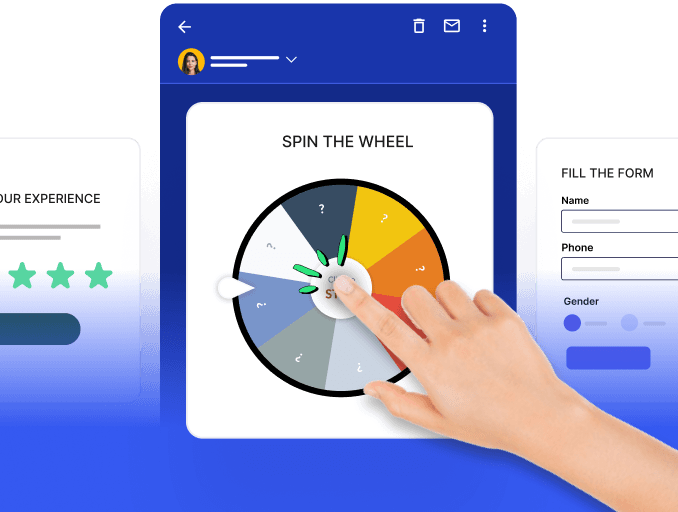When it comes to online shopping, customers are on the hunt for great deals, and businesses are focused on being both appealing and profitable. This situation forms a critical factor for setting pricing strategies. If prices are too high, customers might go elsewhere, but too many discounts can make products seem less valuable or might even hurt your margins. Applying discount marketing wisely allows business owners to lure in deal-seekers and increase sales.
In this guide, we will understand the meaning of discount marketing, its benefits, types of discounts, and some tips that you can follow to improve your existing discount marketing strategy if you have one.
Table of contents
What is discount marketing?
Discount marketing is the practice of increasing sales by offering appealing discounts and promotions strategically. Discount marketing helps you benefit from people's natural love for good deals.
Behavioral insights behind discount marketing
Our brains naturally gravitate towards special deals and experience a sense of urgency to avoid the Fear Of Missing Out (FOMO). Even a slight discount can create a feeling of exclusivity, for example, just a $10 discount on online groceries can increase oxytocin, which makes us happy, by 14%. Marketers skillfully exploit these instincts to divert online shoppers from their competitors, often utilizing tempting discounts.
People have different reasons for seeking deals, for example, bargain hunters are different from those who look for luxury. This is the reason why timing is really important in ecommerce business. Sales during holidays help get rid of extra stock, and discounts during slow times increase customers. However, the same discount might not work if the timing is off. Therefore, understanding the psychology behind discounts, habits, and behavior, and maintaining a balanced approach becomes even more important.
Benefits of giving discounts
Discounts aren't just about reducing prices; they bring several benefits to businesses. Here's how offering discounts can be a powerful tool in your marketing arsenal.
Perception of value
Offering discounts can create a perception of value among consumers, making them feel they are getting more for their money. This can improve customer satisfaction and loyalty, as they perceive the product or service as a good deal.
Research insights
Offering discounts can generate valuable customer data and purchasing patterns for research insights. This can allow your business to refine marketing strategies, product development, and future sales and discounting strategies.
Strategic positioning
Strategic brand positioning through discounts can attract new customers and create brand awareness by positioning your company as affordable and customer-friendly in the market. It also helps in differentiating the brand from competitors who may not offer similar discounts.
Inventory control
Inventory control through discounts helps businesses clear out old or excess stock efficiently while making room for new products and improving cash flow. This strategy also aids in managing stock levels and reducing storage costs.
Lifetime value growth
Offering significant discounts can boost customer loyalty and repeat purchases while increasing the lifetime value of customers as they continue to choose the brand over time. Discounts also encourage larger or more frequent purchases, directly contributing to overall revenue growth from loyal customers.
Types of discounts to offer
Now that we understand the benefits of giving discounts let us understand what types of discounts you can offer to your customers.
- Percentage discount: A reduction in price by a specific percentage.
- Price-off: A direct reduction in price by a specific dollar amount.
- Buy One Get One Free (BOGO): A deal where buying one product allows you to get another one for free.
- Multi-buy: Discounts are applied when you are purchasing multiple units of a product.
- Free shipping: Elimination of shipping costs for a purchase.
- Gift with purchase: A complimentary item is given with a specific purchase.
- Volume discount: Reduced prices for buying in bulk.
Discount marketing strategies to use
Efficient and effective discount marketing strategies are essential for attracting and retaining customers. Here are some key approaches you can use to offer discounts and boost your sales and customer engagement:
Special offers for new visitors
You can encourage first time visitors to subscribe to your mailing list or create an account on your store by offering a discount code. This creates a relationship between you and the customer and creates immediate purchase pressure.
Loyal customer rewards
You can recognize and reward repeat customers with exclusive discounts or perks, reinforcing their decision to stay loyal to your brand and encouraging continued patronage. This can also be specific to your loyalty program members.
Holiday sales boost
You can leverage the holiday shopping season by offering themed discounts or promotions. This can help you appeal to a customer’s festive spirit and increased willingness to spend.
Early-bird discounts on new products
You can attract customers to new product launches with early-bird discounts and create initial interest and sales momentum without demanding full commitment to regular prices.
Discounts on abandoned carts
You can address cart abandonment by sending abandoned cart emails reminding customers of the items they left behind and offering a discount on the total cart value.
Referral rewards for customers
You can encourage existing customers to refer friends with discount offers or rewards for each successful referral. You can give discounts to the referred people to encourage them to make their first purchase. This can help you expand your customer base through trusted recommendations.
Custom retargeting offers
You can utilize retargeting ads to reach visitors who showed interest but didn't make a purchase and offer tailored discounts to rekindle their interest and encourage a transaction.
Post-event follow-up offers
You can capitalize on the interest of event attendees by sending your customers exclusive discounts or offers after the event. This can help you convert their initial engagement into sales.
Gamification
You can improve your discount strategy by mixing it with excitement and engagement. Consider introducing interactive games and challenges, not just on your website but also in AMP-powered emails. This approach transforms each purchase into a more enjoyable experience. In addition, you can engage your audience through social media contests. Encourage customers to share their positive experiences or creative content related to your brand.
Best practices to offer discounts
Let’s have a look and explore these best practices to improve customer engagement and drive sales.
- Offer time-limited discounts to create urgency resulting in quick purchases.
- Offer exclusive discounts on select inventory to create a sense of scarcity and exclusivity.
- Apply discounts to bestsellers or trending items to increase footfall and attract a broader customer base.
- Utilize discounts strategically to encourage the purchase of complementary or higher-value products.
- Implement a discount pricing strategy where the cost per item decreases as the number of items or service level increases. This will help you to incentivize higher spending per transaction.
- Include complimentary services or products with a purchase, adding value to the primary product and enhancing customer satisfaction.
Conclusion
Discount marketing is a great way to improve brand visibility, and engagement and turn new leads into repeat customers. Simple tactics like coupons, limited time offers, and flash sales can prevent visitors from leaving your site empty-handed. But it is also crucial to customize these discounts to fit your audience's interests, which in turn can lead to higher conversion rates, more web traffic, and increased sales profits.







